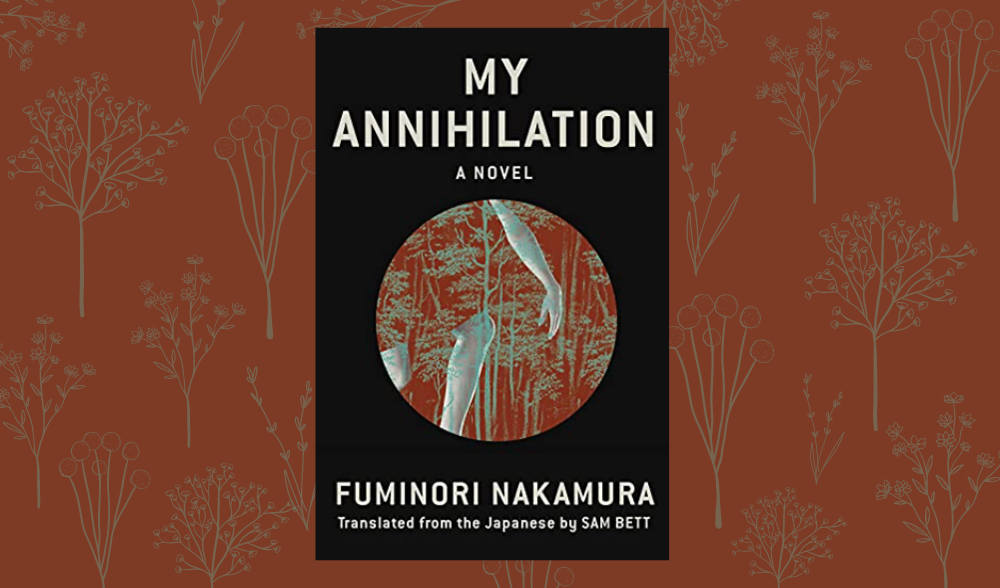BOOK REVIEW EDITOR ELLA KELLEHER WRITES – What exactly is the ‘self,’ and how can it be defined? From modern psychology, we know that human minds can be usurped through drastic techniques such as brainwashing, manipulation, and even hypnosis. Elusive and slippery in nature, the malleable ‘self’ forms and reforms in response to social interaction and individual encounters. The answer that enigmatic author Fuminori Nakamura offers us is entirely unsettling: “Under a particular set of circumstances, it becomes impossible to tell.” In other words, there is no ‘self’ because there is no true ‘individual’ to begin with.

Fuminori Nakamura’s latest work, My Annihilation (2022), is a thriller that descends from a long line of “antisocial novels” – works of fiction that refuse to abide by a conventional structure and focus rather on the existential. The story begins with an unnamed narrator who uncovers a manuscript in one of the rooms of a remote mountain lodge. The text was written by a man named Ryodai Kozuka, whose identity the narrator wants to overtake. However, the novel’s deliberate disdain of linear storytelling suggests that the truth might not be what the reader is led to believe.
The first few pages delve into Kozuka’s dark past. We learn about his violence and contempt for his younger sister, his Oedipean thoughts toward his mother, and his simultaneous desire to harm everyone around him. The original narrator gets lost in the murky spiral of Kozuka’s confessional writings, never again to resurface as a clear and distinct character. Kozuka’s own crimes become infused with his near-clinical examination of Tsutomu Miyazaki, a real-life Japanese serial killer executed in 2008 for the kidnapping and murder of four young girls.

Who, then, is the true narrator of this tale? Could it be the unnamed man in the mountain lodge who stumbles upon the manuscript? Is it Ryodai Kozuka himself? Or does the story instead focus on Miyazaki? There is no clear answer. Nakamura’s dizzying novel helixes into a web of disillusionment and confusion. All plotlines are expertly weaved together by Nakamura himself and translator Sam Bett to create a story of much greater meaning: the various dark tales in Nakamura’s book exist to prove to the reader the inability of the human psyche to separate reality from fantasy. The question is not what we can understand or perceive as an objective truth. The question is, “who really am ‘I’?”
In one twist of the plot, the mysterious narrator falls in love with a traumatized young woman named Yukari. Having a history of incest, suicide, and substance abuse led Yukari down a disastrous path of mental illness. Seeking some form of psychological solace, she stumbles upon the narrator, who we are told is a licensed psychiatrist. In pained desperation at his lover’s misery, the narrator lamentingly asks, “Why do we have to suffer like this? Why must we endure such pain?” As the narrator fruitlessly tries to erase Yukari’s memories through electric shock therapy, hypnosis, and even romantic manipulation, he realizes that no matter what, the bad memories will always somehow resurface. Through this tragic relationship, the reader garners a piece of Aristotelian wisdom: “‘Even gods cannot change the past.’” The most impressionable parts of our past, which tend to be our traumas, form the foundation of who we become.
Powerful, unpredictable stories allow for the impossible to occur. They let readers inhabit the body and minds of others to feel outside the usual. In a similar manner to the narrator’s brainwashing of Yukari, readers convince themselves out of their own realities to comfort the darkness infiltrating their lives. This is where Nakamura stumbles into grey-scaled ethical territory – one where Nakamura tilts his glass to the reader and dares them to try to answer his conundrum: What is the difference, if there is one, between pain and pleasure? When does an innocent white lie become a necessary countermeasure to a crueler truth? Can the ‘self’ mean anything at all if it can be readily annihilated? Nakamura’s philosophical brilliance shines through each page of his latest sadistic, genius thriller.

Former LMU English Honors Graduate Ella Kelleher is the book review editor-in-chief and a contributing staff writer for Asia Media International. Her English studies featured a concentration in multi-ethnic literature.

